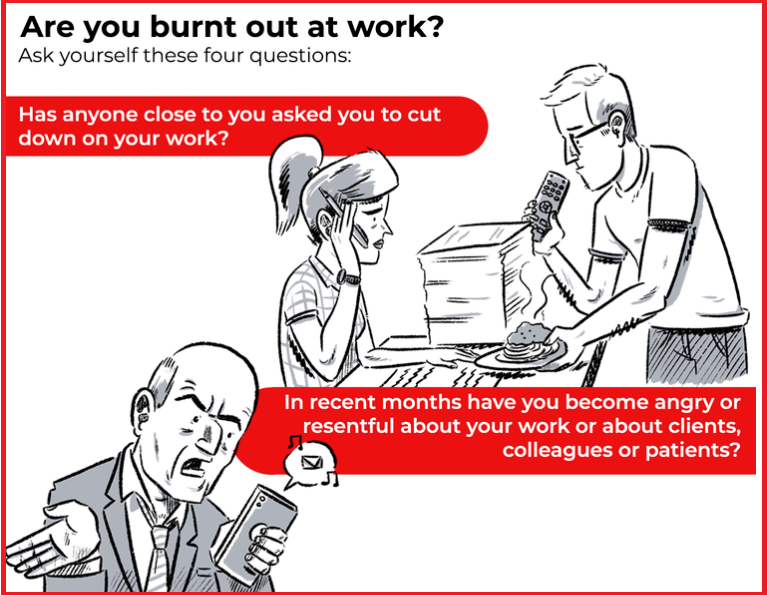Curated by the Knowledge Team of ICS Career GPS
Career

These are the signs that you’re suffering from burnout at work
Excertps from article by Michael Musker, writer, South Australian Health & Medical Research Institute, published in weforum.org
In the era of smartphones and 24-7 emails, it’s becoming increasingly difficult to switch off from the workplace and from those who have power over us. It’s normal to feel stressed at work from time to time. But for some people, the stress becomes all-consuming, leading to exhaustion, cynicism and hatred towards your job. This is known as burnout.
The newly listed dimensions of burnout are:
- Feelings of energy depletion or exhaustion
- Increased mental distance from one’s job, or feelings of negativism or cynicism related to one’s job
- Reduced professional efficacy (work performance)
How do you know if you’re burnt out?
If you think you might be suffering burnout, ask yourself the following questions:
1. has anyone close to you asked you to cut down on your work?
2. in recent months have you become angry or resentful about your work or about colleagues, clients or patients?
3. do you feel guilty that you are not spending enough time with your friends, family or even yourself?
4. do you find yourself becoming increasingly emotional, for example crying, getting angry, shouting, or feeling tense for no obvious reason?
If you answered yes to any of these questions, it might be time for change.
What causes burnout?
We all have different levels of capacity to cope with emotional and physical strains. When we exceed our ability to cope, something has to give; the body becomes stressed if you push yourself either mentally or physically beyond your capacity.
People who burn out often feel a sense of emotional exhaustion or indifference, and may treat colleagues, clients or patients in a detached or dehumanised way. They become distant from their job and lose the zeal for their chosen career. They might become cynical, less effective at work, and lack the desire for personal achievement.
It’s OK to say no to more work
Employers have an organisational obligation to promote staff well-being and ensure staff aren’t overworked, overstressed and headed towards burnout.
While burnout isn’t a mental health disorder, it can lead to more serious issues such as family breakdowns, chronic fatigue syndrome, anxiety, depression, insomnia, and alcohol and drug abuse.
There are things we can all do to reduce our own risk of burnout. One is to boost our levels of resilience. This means we’re able to respond to stress in a healthy way and can bounce back after challenges and grow stronger in the process.
You can build your resilience by learning to switch off, setting boundaries for your work, and thinking more about play. As much as you can, inoculate yourself against job interference and prevent it from ebbing into your personal life.
No matter what your profession, don’t let your job become the only way you define yourself as a person.
Education

NEP’s push for Multilingualism, a gateway of opportunities
Excerpts from article by Karan Verma published in Outlook India
The New Education Policy (NEP) 2020 stresses on building a knowledge economy driven by skills and it stresses on achieving it through a multilingual framework. The NEP lays emphasis on the usage of local language till at least Class 5 and preferably till Class 8. In total it focus on students having command over 3 languages, 2 of which need to be native.
It also aims to standardise the Sign Language across the country for students with hearing impairment.
The move sets the tone for creating an ecosystem where the state and center have to invest in hiring teachers well versed in local languages. They will also invest in the preparation of the curriculum in different languages. This will sow the seeds of cultural assimilation.
In today’s corporate setup, one of the biggest challenges of team management is integration of people from different cultural backgrounds. With NEP, students will find it easier to get along with people across different cultures and languages.
The importance of multilingual professionals
Today, every business is looking to hire people well versed in different regional languages with a hope to expand in those respective territories. From the content on digital streaming platforms to translated books, multilingualism is a part of not just our cultural ethos but also a tremendous commercial opportunity.
India with all its diversity in terms of culture and languages has enormous potential in terms of tourism that is waiting to be unleashed. Today, the global IT giants are investing huge amounts to cater to people who are better versed in regional languages. We see that on social media and messaging sites.
The NEP 2020 also makes it loud and clear: Skills are the new grades. Education, especially post coronavirus, has to focus on skills and deliverables.
Today coding, data analytics and digital marketing are the skills required for a bright future. Coupled with multilingualism, these skills can also stoke the entrepreneurial spirit in students.
Often times, language is a barrier in entrepreneurship, as budding entrepreneurs are often hesitant in expanding across cities and states but with a multilingual approach, they can overcome this barrier.
(Disclaimer: The opinions expressed in the article mentioned above are those of the author(s). They do not purport to reflect the opinions or views of ICS Career GPS or its staff.)



